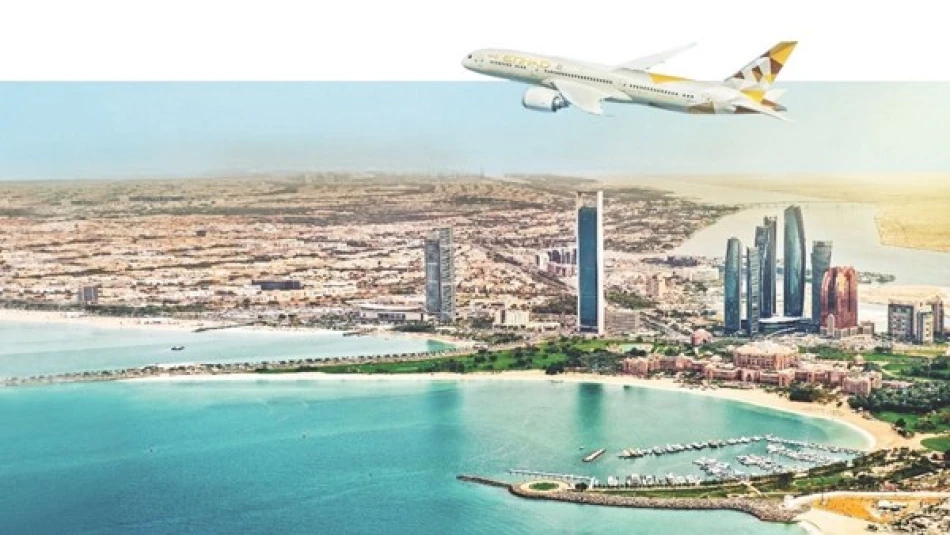
Soaring to New Heights: Etihad Airways Celebrates 20 Million Passengers and Over 100 Aircraft in Its Fleet
Etihad Airways Doubles Passenger Numbers to 20 Million in Record-Breaking Growth Surge
Etihad Airways has achieved a historic milestone by carrying 20 million passengers for the first time in its history, doubling its annual passenger count from 10 million to 20 million in just two and a half years. This remarkable growth trajectory, combined with record profits of 685 million dirhams in Q1 and an expanding fleet now exceeding 100 aircraft, positions the Abu Dhabi-based carrier as the region's fastest-growing airline amid a broader Middle Eastern aviation boom.
Unprecedented Growth Outpaces Regional Competition
CEO Antonoaldo Neves emphasized the airline's unique position in the market, stating that Etihad is "the only airline witnessing growth at this pace in the region." This claim carries significant weight given the competitive landscape dominated by Emirates and Qatar Airways, both of which have established themselves as global aviation giants over the past two decades.
The doubling of passenger numbers in such a short timeframe reflects several key factors: surging post-pandemic travel demand, Abu Dhabi's strategic positioning as a connecting hub between Europe and Asia, and what appears to be a successful pivot from Etihad's troubled expansion period in the 2010s when it struggled with failed investments in airlines like Alitalia and Air Berlin.
Fleet Expansion Signals Ambitious Market Capture
Etihad's recent fleet additions tell a story of calculated growth. The airline has added three aircraft to reach over 100 operational planes, including the return of its seventh Airbus A380 and delivery of a new Boeing 787-9 from Charleston with an all-Emirati crew. Most notably, it received the first of three new Airbus A350-1000 aircraft on July 18.
The carrier's pride in operating "one of the youngest fleets in the sector" represents a strategic advantage in fuel efficiency and passenger appeal. With 18 additional new aircraft expected in 2025, including the new A321LR fleet launching August 1, Etihad is positioning itself for sustained growth rather than opportunistic expansion.
Premium Experience as Differentiation Strategy
The airline's celebration of its 20-millionth passenger milestone—surprising a couple traveling from New Delhi to Toronto with upgrades to business class and the unique three-room "Residence" suite on the A380—demonstrates a focus on premium passenger experience as a competitive differentiator.
This strategy mirrors successful approaches by Singapore Airlines and Emirates, where exceptional service quality justifies premium pricing and builds brand loyalty in an increasingly commoditized industry.
Network Expansion Reflects Abu Dhabi's Geopolitical Strategy
Etihad's addition of 17 new destinations this year, bringing its network to approximately 90 destinations by end-2025, aligns with Abu Dhabi's broader economic diversification strategy. The emirate is positioning itself as a global gateway, competing directly with Dubai's established hub model while leveraging its geographic position between major economic centers.
This expansion comes at a time when traditional European carriers face capacity constraints and Middle Eastern airlines are capitalizing on their strategic locations for Asia-Europe traffic flows, particularly as Russian airspace restrictions continue to impact northern route options.
Market Implications and Future Outlook
Etihad's 2030 targets—125+ destinations, 170+ aircraft, and 38 million annual passengers—represent more than ambitious planning; they signal a fundamental shift in Middle Eastern aviation dynamics. The airline's rapid growth suggests it may exceed these seven-year strategic projections, potentially disrupting established market hierarchies.
For investors and industry observers, Etihad's transformation from a struggling state carrier to a profitable growth engine demonstrates how strategic focus and market timing can reshape competitive landscapes. The airline's success also reflects Abu Dhabi's economic strength and its ability to support major infrastructure investments during a period when many carriers face financial constraints.
The broader implications extend beyond aviation: Etihad's growth reinforces Abu Dhabi's emergence as a serious alternative to Dubai's dominance in regional business and tourism, potentially reshaping investment flows and economic development patterns across the UAE.
Most Viewed News

 Layla Al Mansoori
Layla Al Mansoori






